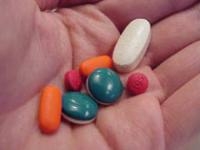Effective psychological treatment without drugs in teens
Submitted on 7 July 2006 - 10:29pm
This article is reproduced by CienciaPR with permission from the original source.

By Leysa Caro González
Primera Hora
Through the years people have thought that antidepressants are indispensable to fight emotional problems. Nevertheless, these professors demonstrated that working with the “negative thoughts” through cognitive therapies, these teens can become emotionally stable again.
“We are not including drugs in the studies because we want to demonstrate that these are not necessary. In effect, these are the clinical tests in Puerto Rico that demonstrate that these psychological treatments are effective”, pointed one of the collaborators, Guillermo Bernal.
Depression is the main cause of incapacity world-wide. In Puerto Rico it has been demonstrated that between 10-20% of the adolescents present symptoms of depression. Meanwhile, in the infantile population it affects between three and five percent.
The investigations, made by professors Bernal, Jeanette Rosselló and Carmen L. Rivera, were developed through the University Center of Services and Psychological Studies (Cusep) of the Department of Psychology. The three studies, one still ongoing, have demonstrated the positive properties of Cognitive Behavioral Therapy (CBT) and Intrpersonal Therapy (ITP), the first being the most effective.
CBT consists essentially on the identification of those irrational thoughts. This is done by autoanalysis by the patient, whom the therapist motivates and supervises. Once they are identified they are replaced by more logical thoughts that fit into reality.
ITP, on the other hand, recognizes the early roots of depression but focuses towards the symptoms and what can be causing the problem. This method looks to improve the communication abilities and increases the self-esteem in short time.
The first study, done in 1991 with 71 adolescents, reflected the effectiveness of both therapies, in comparison with a group of adolescents that was not exposed to them.
The participants reflected an improvement of near ten percent after being treated. “We can conclude that the treatments are better that simply doing nothing. We can affirm that both therapies are effective to tackle depression”, commented Bernal on the first investigation.
The second clinical test was made between 1995 and 2000 with 112 adolescents. This one, on the other hand, demonstrated that, although both therapies are viable, CBT is more effective.
The adolescents, in average, lowered their symptoms from 23.63 points to 11.09 points with CBT. While, with ITP they lowered it from 23.13 points to 13.69 points. The symptom levels are obtained through a questionnaire before the beginning of the treatment.
In agreement with the results, both therapies not only help the adolescents to surpass the condition, but that also showed a significant reduction in the depressive symptoms of the parents. They also improved the familiar dynamics in relation to affective expressions, according to the patients perception.
The third study, still in the works, also analyzes the effectiveness of both therapies, but it incorporates a series of psychology education workshops directed to the parents, so they can understand and help their children. Until the moment 47 adolescents and, at least, one of their parents have participated in this third investigation.
According to the preliminary results, the participants managed to reduce their symptoms from 23.73 points to 12.09 points with the therapies.
Both professors advised parents to be aware of behavioral changes in their children, since these could alert on a possible depression. Not taking care of a depression in time, could entail greater consequences, alerted Rivera.







